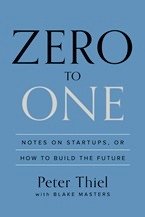
VOLTAR PARA ARTIGOS
Peter Thiel’s “From Zero to One”: Any lessons to be learnt?
By Hans J. Apostel

Peter Thiel’s “From Zero to One” is certainly a great bedside or beach book, which enlightens you about the essentials of how to become a successful entrepreneur and billionaire. In case the fundamental success ingredients don’t apply for you: being very young (college age), be a fish in the right aquarium (Silicon Valley) or have developed at the right time and dominate a proprietary and exclusive breakthrough technology or a disruptive idea capable of changing possibly how we live, shop or communicate, what can you do?
You can be very smart and focused as Peter Thiel, surrounding yourself with people who have those required qualities, helping them to transform breakthrough ideas from the drawing board into an organized business, stretching your value-added from basic strategizing to teambuilding, financing and hard-nosed execution. He did so with Pay-Pal, Facebook and Palantir Technologies, between others in an extraordinarily successful manner. One of his former team members Reid Hoffman, created this network, LinkedIn.
But Venture Capital and an infinite army of investors have been around for a long time. So what can we take home from this book as practical considerations? At least, this would be my take: being permanently exposed to highly talented people with out-of-the-box thinking and far-away-from-mainstream background is certainly one basic factor. But if you do not live on 1600 Amphitheatre Parkway, Mountain View (Google Headquarter) you may consider to be much more selective with whom you spend your time.
Take the 100 people you have been spending most of your time during the current year: erase the 20 contacts who are not and will not be relevant to your life goals or business objectives and, as the case may be, are of no entertainment value. Identify the top 20 in terms of relevance and program to spend double the time with them. Of course, consider adding those who should be on your list. Do the same with the time you spend with your distinct business activities. Cut off immediately those activities that have little hope to generate a sufficient return and don’t fall into the Sunk Cost Fallacy (“I have already spend so much time and money on this”).
Focus on what works and pull the plug of what doesn’t will be a great step in the right direction. And don’t get distracted or impatient if you have more money than ideas and know your own talents. Great investors aren’t necessarily great traders. Peter Thiel’s multi-billion global macro hedge fund Clarium Capital run into negative terrain with the 2008 crisis and delivered in the subsequent years very volatile returns making untimely bets on currencies, oil and inflation, as did most of the entire hedge fund industry being caught on the wrong foot.
That may be the reason why we will not see anytime soon a book released by the same author on “How to beat the Markets”.
By Hans J. Apostel

Peter Thiel’s “From Zero to One” is certainly a great bedside or beach book, which enlightens you about the essentials of how to become a successful entrepreneur and billionaire. In case the fundamental success ingredients don’t apply for you: being very young (college age), be a fish in the right aquarium (Silicon Valley) or have developed at the right time and dominate a proprietary and exclusive breakthrough technology or a disruptive idea capable of changing possibly how we live, shop or communicate, what can you do?
You can be very smart and focused as Peter Thiel, surrounding yourself with people who have those required qualities, helping them to transform breakthrough ideas from the drawing board into an organized business, stretching your value-added from basic strategizing to teambuilding, financing and hard-nosed execution. He did so with Pay-Pal, Facebook and Palantir Technologies, between others in an extraordinarily successful manner. One of his former team members Reid Hoffman, created this network, LinkedIn.
But Venture Capital and an infinite army of investors have been around for a long time. So what can we take home from this book as practical considerations? At least, this would be my take: being permanently exposed to highly talented people with out-of-the-box thinking and far-away-from-mainstream background is certainly one basic factor. But if you do not live on 1600 Amphitheatre Parkway, Mountain View (Google Headquarter) you may consider to be much more selective with whom you spend your time.
Take the 100 people you have been spending most of your time during the current year: erase the 20 contacts who are not and will not be relevant to your life goals or business objectives and, as the case may be, are of no entertainment value. Identify the top 20 in terms of relevance and program to spend double the time with them. Of course, consider adding those who should be on your list. Do the same with the time you spend with your distinct business activities. Cut off immediately those activities that have little hope to generate a sufficient return and don’t fall into the Sunk Cost Fallacy (“I have already spend so much time and money on this”).
Focus on what works and pull the plug of what doesn’t will be a great step in the right direction. And don’t get distracted or impatient if you have more money than ideas and know your own talents. Great investors aren’t necessarily great traders. Peter Thiel’s multi-billion global macro hedge fund Clarium Capital run into negative terrain with the 2008 crisis and delivered in the subsequent years very volatile returns making untimely bets on currencies, oil and inflation, as did most of the entire hedge fund industry being caught on the wrong foot.
That may be the reason why we will not see anytime soon a book released by the same author on “How to beat the Markets”.

